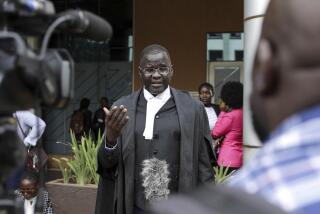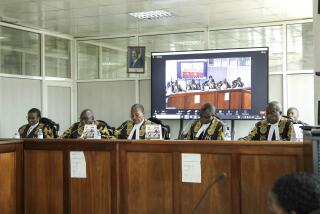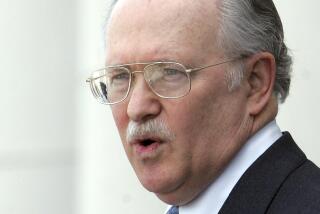South Africa’s Zuma names controversial new chief justice
South African President Jacob Zuma on Thursday brushed aside criticism from gay rights and women’s groups and appointed a conservative Christian to head the high court, a move that will affect the country’s judicial system for at least a decade.
Justice Mogoeng Mogoeng, who told a judicial panel last weekend that he believes God chose him to head the Constitutional Court, is a member of the Winners Chapel, which believes homosexuality is a disease that is “curable.”
He has been widely criticized for several legal decisions that threw out jail sentences of men convicted of marital rape or assaulting their girlfriends and reduced the sentences of men convicted of raping children.
Mogoeng, who has served as a justice for two years, will lead the court during the last decade of his 12-year term. The high court decides questions related to the constitution.
He also will head the Judicial Services Commission, which makes recommendations to the president on judicial appointments. Critics say his influence in appointments probably will lead to a more conservative judiciary prone to deferring to the executive.
At a commission hearing on Mogoeng’s appointment over the weekend, the judge dismissed charges that he was anti-gay.
“My church’s opposition to homosexuality is not something peculiar to it, nor does the church have as its core value the attitude that homosexuality should not be practiced or is a deviant behavior. It is based purely on the biblical injunction that a man should marry a woman and that there shall be a husband and a wife,” he said.
He also said he had presided over several rape cases in which he had imposed substantial sentences.
The appointment was among the most controversial Zuma has made, opposed by the powerful trade union council COSATU, the main opposition Democratic Alliance party and a raft of legal rights, women’s and gay and lesbian organizations.
But announcing the appointment Thursday, Zuma commended the new chief justice for his dignity in the face of critics. Mogoeng responded that he would not betray the president’s trust.
South Africa’s liberal constitution is out of step with homophobic traditionalists and Christian fundamentalists, who make up a large part of South African society. Gay and women’s activists fear that passages in the constitution, notably those guaranteeing equal rights for gays and lesbians, and subsequent court decisions protecting gay marriage could be undermined.
“His convictions are clearly in contradiction with the constitution. The appointed person believes he has been sent by God to save the country,” said Mazibuko Jara, a representative of the Lesbian and Gay Equality Project. “I find it impossible to believe he can separate his convictions from what he does in the court” and on the commission.
“Can you imagine if he had to deal with a case on same-sex marriage, given that he believes his mandate comes from God?”
Mogoeng’s critics cite several cases to explain their concern about his judicial judgment.
He overturned a jail sentence of a man who tied his girlfriend with wire to a car and dragged her over gravel at high speed. His decision that the sentence was too harsh was based on his view the victim “provoked” her attacker. Instead he imposed a $570 fine.
In another case, Mogoeng found that a jail sentence was too harsh for a man convicted of raping his wife. The man had struck and tussled with her, but Mogoeng said this amounted to “minimum force” that caused “no real harm.”
In 2005, while reducing the sentence for a man who attempted to rape a 7-year-old girl from five years to three, he explained that it was a first offense and the girl wasn’t seriously injured.
The South African Litigation Center, an advocacy group, cited “worrying” comments he made in 2007 while rejecting a man’s appeal in the rape of a 14-year-old girl.
“The victim claims that the sexual intercourse was very painful but there was clearly nothing about her to suggest that she was in any pain when she arrived home,” the justice said. “There was no limping or crying or anything of the kind.”
Another controversial finding involved the judge dissenting from a majority Constitutional Court judgment that it wasn’t defamatory to call someone homosexual because homosexuals are protected by the constitution.
Mogoeng did not explain why he disagreed with the finding, but critics say his dissent raised questions about his attitudes toward homosexuality.
In a submission to the Judicial Services Commission opposing his appointment, the Women’s Legal Center said that by failing to publish his reasons, Mogoeng betrayed the principle of judicial transparency and accountability.
More to Read
Start your day right
Sign up for Essential California for news, features and recommendations from the L.A. Times and beyond in your inbox six days a week.
You may occasionally receive promotional content from the Los Angeles Times.






